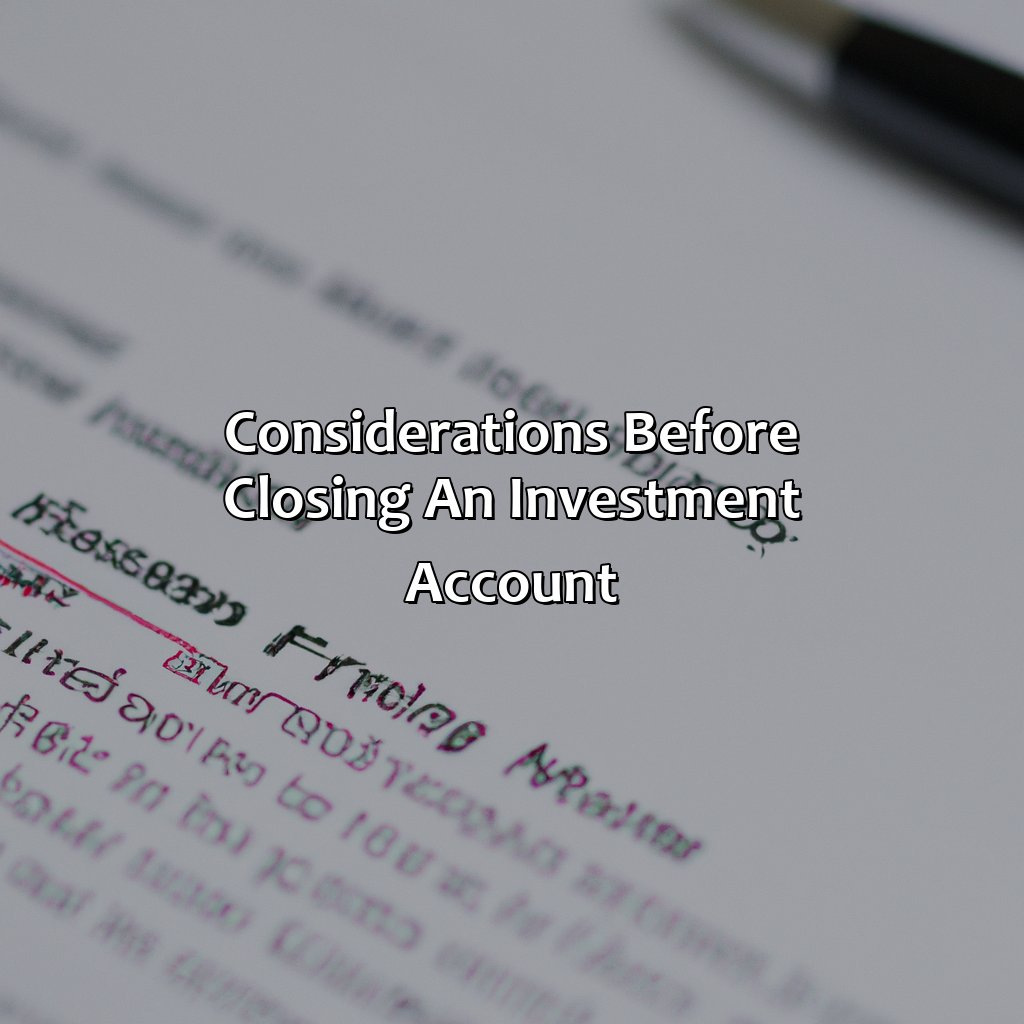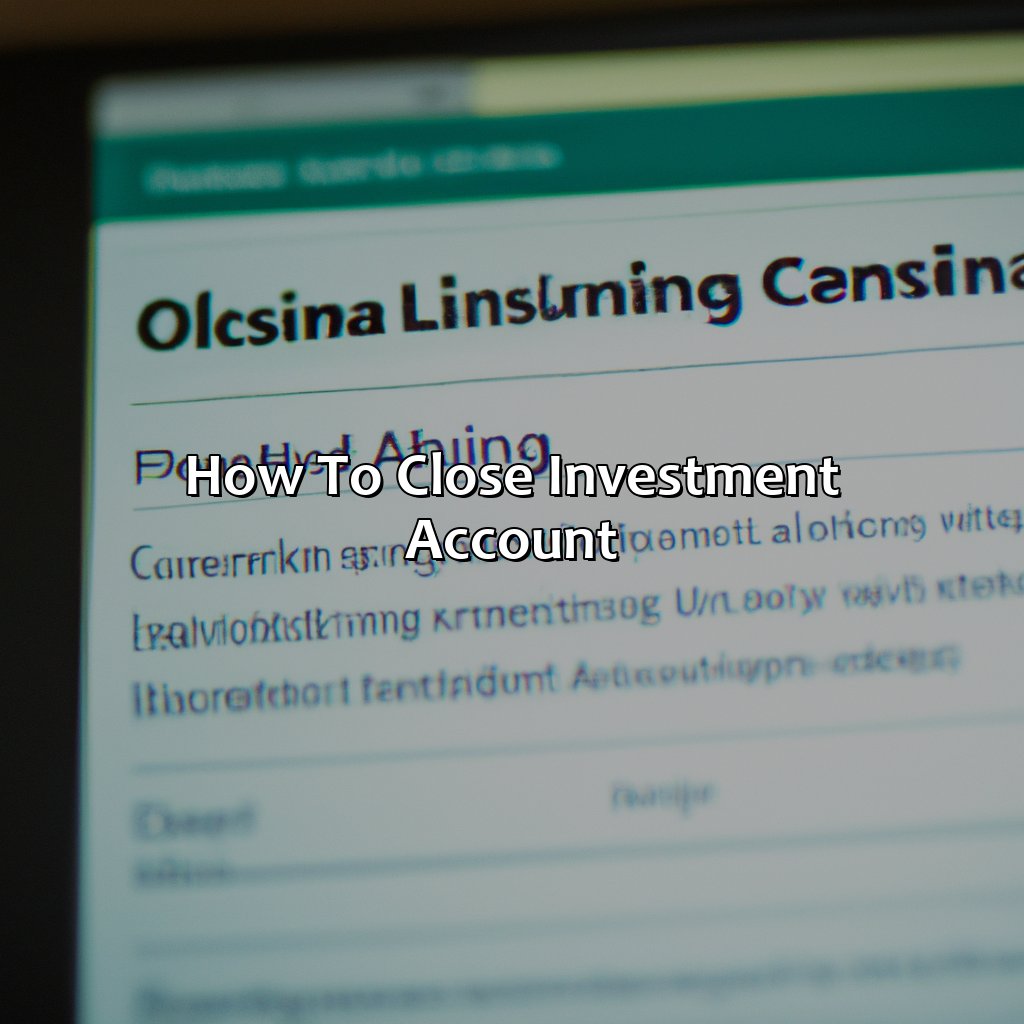How To Close Investment Account?
Key Takeaway:
- Changing investment goals, dissatisfaction with investment performance, and need for liquidity are some common reasons that prompt individuals to close their investment accounts.
- Closing an investment account involves a few key steps including notifying your financial advisor/investment firm, selling or transferring assets, and completing required paperwork.
- Before closing an investment account, it is important to consider potential tax implications, early withdrawal penalties, and the impact on your overall financial plan.
Are you looking to close an investment account? Navigating investments may seem daunting, but don’t worry – this article will provide you with the information needed to close your investment account. With our simple step-by-step guide, you can confidently take control of your investments and close your account.
Reasons for closing an investment account
Why close an investment account? Reasons can be found in the section discussing it. Sub-sections include:
- Change in Investment Goals
- Dissatisfaction with Investment Performance
- Need for Liquidity
These offer unique explanations for why investors may decide to shut down their accounts.

Image credits: retiregenz.com by Harry Arnold
Change in investment goals
When one’s investment goals change, closing an investment account may be necessary. This could be due to a shift in priorities, a new life event such as marriage or children, or simply a change in financial circumstances. Whatever the reason may be, it is important to ensure that the decision to close an investment account is made after careful consideration and consultation with financial experts or advisors.
In such situations, it is advisable to review one’s investments periodically and reassess long-term goals. If these goals have changed substantially from the original objective of the investment plan, it might make sense to close the account. The decision to withdraw funds from the account may depend on various factors such as tax implications and redemption fees that might apply.
Finally, there are several steps involved in closing an investment account, including liquidating all investments and transferring funds back to a checking or savings account. Before making such decisions, investors should carefully evaluate their options with regard to potential capital gains or losses resulting from selling investments.
One investor had invested his money in stocks aggressively aiming for short term profits. Soon he was feeling disenchanted with stock market fluctuations and wanted to divest his holdings completely. He consulted his financial advisor who reviewed his portfolio and suggested a different strategy for him going forward. Based on this advice and his reassessment of his personal situation and finance goals, he closed his aggressive stock position which gave relief both mentally and financially.
If your investment account was a sports team, it would be the Cleveland Browns – time to cut your losses and move on.
Dissatisfaction with investment performance
When investment performance fails to meet expectations, investors may consider closing their investment accounts. Unsatisfactory returns, inadequate diversification and high fees are a few reasons for this decision. Often, investors use a combination of factors to arrive at the conclusion that their investment account is no longer worth holding onto. Once the decision has been made, follow the guidelines provided by your financial institution with caution and care.
The dissatisfaction with investment performance leads many investors to close their investment accounts in search of better opportunities and returns. When the account’s returns do not match the investor’s expectations or fail to provide sufficient diversification within his portfolio, it becomes necessary to reassess its viability as an investment vehicle.
It is essential to understand that various investments have different degrees of risk involved- some are inherently riskier than others. Depending on your portfolio goals and risk tolerance, you should consider alternatives such as lower-risk investments or more diversified portfolios when dissatisfied with current performance.
Closing an investment account requires cautious attention to detail because several pitfalls could lead to unintended consequences if mishandled. Before closing the account, investors should take measures such as liquidating assets, paying any outstanding debts or taxes before requesting a closure— also ensuring proper completion of all paperwork per regulatory stipulations.
When it comes to needing liquidity, closing your investment account is like breaking open your piggy bank, except with less squealing.
Need for liquidity
Investors may require access to their funds immediately due to unforeseen circumstances, leading to the need for liquidity. The urgency of such situations prompts investors to close their investment accounts quickly. Liquidating investments can also help mitigate risk or losses in falling markets. Investment portfolios should be monitored frequently, and changes made as needed to ensure that sufficient liquidity is always available when required.
It’s crucial for investors to recognize the impact closing an investment account can have on future financial goals and assess whether liquidating their investments is the right choice. Early withdrawal from a long-term investment account may result in penalties and fees, as well as missing out on potential earnings that come with compounding interest over time. Therefore, careful consideration should be given to the ramifications of closing an investment account before taking any action.
In a notable instance, during the 2008 financial crisis, many investors chose to close their accounts and liquidate all positions for fear of losing everything. However, a handful of savvy investors held firm and saw significant returns once market confidence was regained. It underlines why having a diversified and balanced investment portfolio is essential for weathering economic turbulence over time.
Closing an investment account is like breaking up with a bad ex – it’s bittersweet, but necessary for your financial sanity.
Steps to close an investment account
To end an investment account, take these steps:
- Notify the investment firm or your financial advisor.
- Sell or give away all assets.
- Complete the needed paperwork.
- Check that the account is closed.

Image credits: retiregenz.com by James Duncun
Notify your financial advisor or investment firm
It is imperative to inform your investment advisor or firm regarding closing your account. This facilitates transparent communication and ensures critical details are accounted for.
Your investment firm may require specific forms and documentation, such as the account closure form and discharge instruction letter. Submitting these documents promptly avoids potential delays in processing the request.
Consider inquiring about any additional steps required, such as fulfilling outstanding obligations or fees that need to be cleared.
Pro Tip: Before closing an investment account, make sure you have a plan in place for allocating funds from the closed account to another investment vehicle.
Say goodbye to your assets and hello to a little extra cash – selling or transferring them is like getting a breakup bonus.
Sell or transfer assets
To liquidate your investment, disposing or transferring the assets is crucial. Below are essential points to follow for Sell or transfer assets:
- Determine which investments you want to sell or transfer.
- Contact your broker-dealer and ask them their specific requirements for selling or transferring the securities.
- If you plan to sell, determine how you want to achieve it – market order, limit order, or stop loss order method.
- Calculate potential tax implications that may vary by type of holdings and time of sale.
- For the stock certificate, contact your company’s transfer agent to find out how to eject shares from their registration as well as whether any fees are involved.
- Confirm with your new brokerage firm if they accept the transfer of any particular securities.
It is necessary to consider whether a fee applies when removing assets from one brokerage account before taking this step.
Fun fact: According to Statista Research Department in August 2020, U.S. household investors lost nearly $11 trillion in wealth due to the COVID-19 pandemic.
Time to dust off that printer and remind yourself why you hate paperwork, because closing an investment account requires a whole lotta forms.
Complete required paperwork
When it comes to finalizing investments, completing necessary documentation is essential. Documents are imperative to ensure the proper distribution of assets and funds. Learn how to “finalize paperwork” with these easy steps.
- Organize Your Records: Collect all investment account statements and information in one place
- Notify Investments Firms: Notify your firms directly about your intent to discontinue investing
- Complete the Forms: Fill out the required forms provided by your investment company
- Submit Documents: Ensure that all relevant documents have been completed correctly, filed properly, signed and date stamped.
- Closure Confirmation: Wait patiently until you receive confirmation from firm or platform.
As you complete required paperwork, ensure all details are entered correctly, especially bank account details if you require a transfer of funds. In some circumstances, additional documents may be required before an account can be closed.
Did you know multiple copies of physical documents such as W9s or beneficiary listings should be kept on file for a short time? These may come in handy if there are any errors or gaps discovered after an account has been closed. (Source – Investopedia)
Make sure you check your email spam folder because even investment accounts want to ghost you.
Verify closure of account
After requesting to close your investment account, the next important step is to Verify the Closure of the Account. Follow these six steps:
- Check your email for a confirmation of closure.
- If you do not receive an email within a few days, contact customer service.
- Ensure that all transactions are completed and settled before closing your account.
- Review your account statement to ensure no pending transactions or fees are outstanding
- Check if there are any tax implications from closing the account
- Double-check all necessary documents have been signed and confirmed
Additionally, If there are any discrepancies or concerns about the closure status after following these steps, please reach out to the customer service team as soon as possible.
Pro Tip: Keep track of all communications related to closing your investment account and be persistent in following up with any outstanding concerns or issues for a quicker resolution.
With great power comes great responsibility, and the same goes for closing an investment account.
Considerations before closing an investment account
Understand the factors you must consider when deciding to close your investment account. These include tax implications, early withdrawal penalties, and how it will affect your overall financial plan. This section will explain these considerations and introduce the three key sub-sections: taxes, penalties, and the financial plan.

Image credits: retiregenz.com by David Arnold
Tax implications
As you consider closing your investment account, it’s important to understand the potential tax consequences. Depending on the type of account and the investments held within it, closing your account could result in taxable gains or losses.
When you sell securities in a taxable investment account, you may be subject to capital gains taxes. If you’ve held an investment for more than one year, you’ll typically pay long-term capital gains taxes at a lower rate than short-term capital gains taxes.
If you’re closing a retirement account like an IRA or 401(k), there may be additional tax implications. With traditional accounts, distributions are subject to income taxes, while Roth accounts offer tax-free withdrawals as long as certain conditions are met.
It’s essential to consult with a financial advisor or tax professional before making any decisions about closing your investment account. They can help you understand the specific tax implications and develop a plan that minimizes taxes and maximizes your wealth.
A colleague of mine once closed an investment account without considering the potential tax consequences. He was hit with a significant tax bill that could have been avoided with proper planning and guidance from a professional advisor. Don’t make the same mistake – always consider taxes before making any major investment decisions.
Looks like breaking up with your investment account comes with a price tag – and it’s not just emotional.
Early withdrawal penalties
Investors must be aware of penalties for withdrawing their investments early. Hasty fund withdrawals can result in restricted gains or loss of principal. Depending on the account type, an early withdrawal penalty may be applied if funds are withdrawn before the designated holding period expires.
Before closing any investment accounts, investors should thoroughly review account contracts to determine what penalties may apply. Many retirement account investment options levies early withdrawal fees, restricting account freedom until 59-and-a-half years old. The weight penalty is a significant consideration that shouldn’t be taken lightly when planning to close an investment account.
Alongside early withdrawal penalties, investors need to be apprised of account maintenance charges and portfolio transfer expenses before finalizing the closing process. Most brokers require account activity minimums to avoid monthly fees, which come with perpetuating restrictions like mandatory deposits or a minimum balance mandate.
One real-life example of having to manage early withdrawal policies is Microsoft co-founder turned philanthropist Paul Allen. According to reports from 2014, Allen’s $8 billion family office decided to distribute money back to investors because they deemed their current allocations too volatile and high-risky due to new regulations established after the financial crisis of 2008-09. However, as several private equity funds weren’t finished till the set terms were met with proper liquidity constraints, the office asked investors who wished for immediate redemptions for reduced prices below net asset value (NAV) or face potential missed payments or long holding periods.
Closing an investment account without considering its impact on your financial plan is like removing a brick from the foundation of your house and hoping it doesn’t collapse.
Impact on overall financial plan
The decision to close an investment account can have profound implications on your financial plan. It is crucial to understand the impact that such a decision could have, and evaluate alternative options before taking any definitive action. Closing an investment account should only be done after thorough consideration of its effect on your financial goals.
Moreover, closing an investment account requires careful thought and planning. Before committing to closing the account, it is important to weigh up factors such as any penalties or fees associated with the closure, the tax implications of withdrawing investments early, and whether the funds can be invested elsewhere more productively.
When considering whether to close your investment account, it is also worth examining whether you might benefit from transferring funds to another type of investment vehicle or utilizing them in another way entirely. In consultation with a financial advisor, you may find that reallocating funds within your existing investment portfolio could better align with your long-term strategies.
For instance, my friend Sophia found herself considering closing her mutual fund account due to market volatility. She spoke with her financial planner who recommended diversifying within her existing portfolio rather than cashing out altogether. This enabled her investments to continue growing while also providing reassurance during uncertain economic times.
Overall, when considering closing an investment account, it is important to take a strategic perspective and think carefully about all available options for ensuring maximum performance while minimizing risk. Careful analysis of your current situation and consultation with trusted advisors will go a long way towards achieving this goal.
Five Facts About How To Close Investment Account:
- ✅ Closing an investment account may result in tax consequences, such as capital gains or losses. (Source: Investopedia)
- ✅ To close an investment account, you typically need to sell all your holdings and transfer the funds to another account or to your bank account. (Source: NerdWallet)
- ✅ Some investment firms charge fees for closing accounts, especially if you close a retirement account before reaching retirement age. (Source: The Balance)
- ✅ Before closing an investment account, consider the reasons why you want to do so and evaluate other options, such as transferring the account to another firm. (Source: Forbes)
- ✅ If you have a financial advisor, consult with them before closing an investment account to ensure it aligns with your overall financial goals. (Source: Kiplinger)
FAQs about How To Close Investment Account?
1. How do I close my investment account?
To close your investment account, you will need to contact your broker or financial advisor. They will provide you with the necessary forms or instructions to complete the process. Some brokers may require you to liquidate your investments before closing the account.
2. Is there a cost to close my investment account?
It depends on your broker. Some brokers may charge an account closing fee, while others may not charge anything. It’s best to check with your broker to understand their policies and any associated costs.
3. Will closing my investment account affect my credit score?
No, closing an investment account will not have any impact on your credit score. Your credit score is based on your credit activity, not your investment activity.
4. What happens to my investments when I close my account?
When you close your investment account, you will need to liquidate your investments. You can either do this yourself or your broker can help you with the process. Once your investments are liquidated, the funds will be deposited into your account or sent to you via check.
5. How long does it take to close an investment account?
The timeline for closing an investment account can vary depending on your broker and the type of investments you have. Some brokers may require a few days to process the closure, while others may take longer. It’s best to check with your broker to understand their timeline for closing your account.
6. Can I reopen my investment account after closing it?
Yes, in most cases, you can reopen your investment account after closing it. However, you will need to follow the same steps as when you initially opened the account, including completing the necessary forms or speaking with your broker. It’s important to note that you may be subject to any fees or minimum investment requirements that were in place when you previously had the account.
